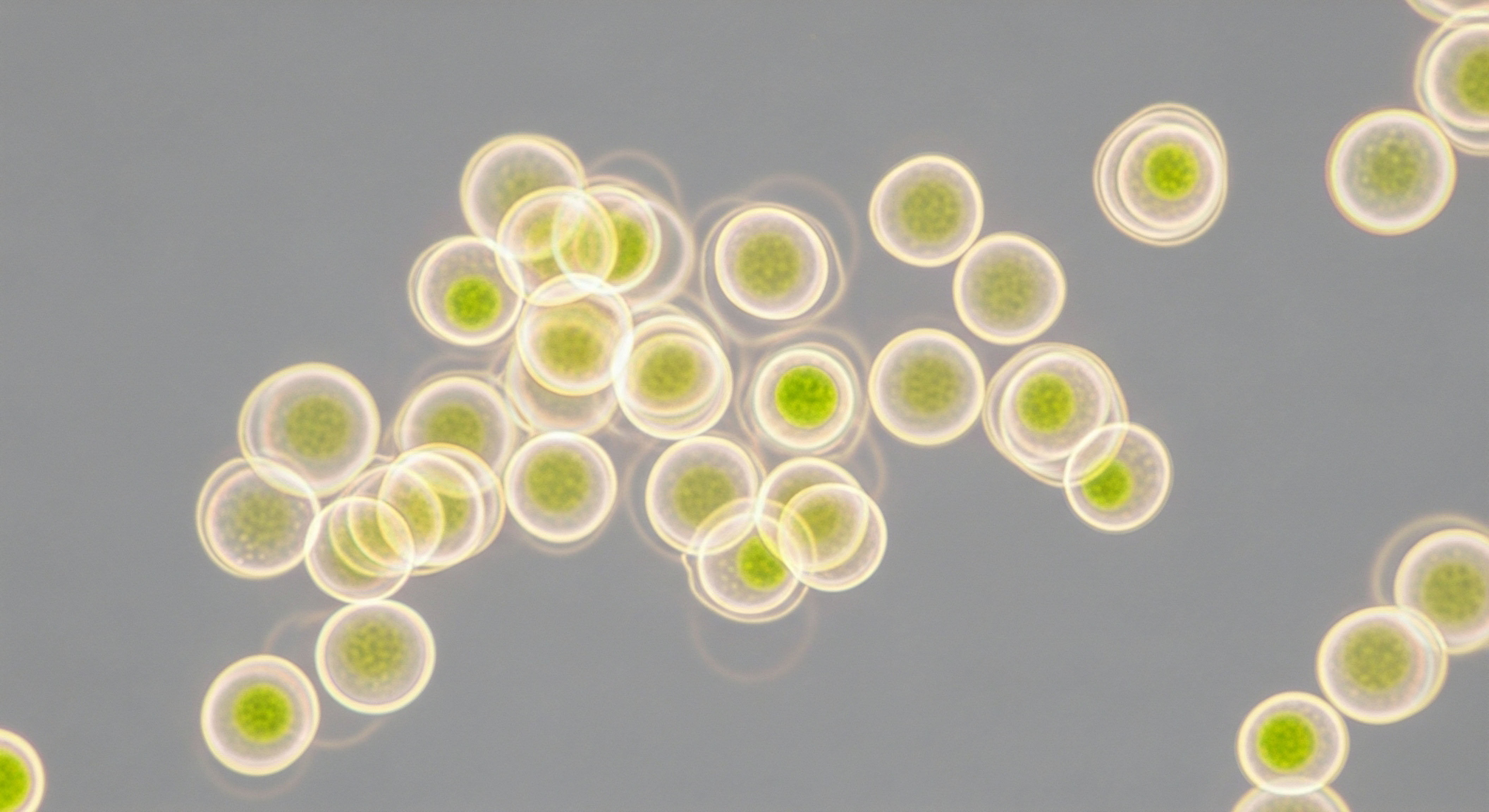

Fundamentals
Many individuals find themselves navigating a landscape of subtle yet persistent changes within their bodies. Perhaps a creeping fatigue has settled in, or a diminished drive has replaced former vigor. You might notice shifts in body composition, a decline in mental sharpness, or a reduced capacity for physical activity.
These experiences, often dismissed as simply “getting older,” can signal deeper imbalances within the body’s intricate messaging system ∞ the endocrine network. Understanding these internal communications is the first step toward reclaiming vitality and function.
Testosterone replacement therapy, or TRT, offers a powerful tool for recalibrating hormonal levels when they fall below optimal ranges. However, the journey toward restored well-being extends beyond exogenous hormone administration. The body operates as a complex, interconnected system, and nutritional strategies play a fundamental role in supporting its overall balance and maximizing the benefits of any hormonal optimization protocol.
Optimizing nutritional intake is a foundational element for supporting hormonal balance and enhancing the effectiveness of testosterone replacement therapy.
Our bodies require specific building blocks and regulatory signals to maintain physiological harmony. When considering hormonal health, particularly during TRT, attention to macronutrients and micronutrients becomes paramount. These dietary components provide the raw materials for hormone synthesis, influence metabolic pathways, and modulate cellular responsiveness to hormonal signals. A diet rich in whole, unprocessed foods supports the body’s innate intelligence, allowing it to function with greater efficiency.

The Body’s Internal Messaging System
Hormones serve as chemical messengers, orchestrating a vast array of bodily functions, from metabolism and mood to muscle growth and reproductive health. The endocrine system, a network of glands, produces and releases these hormones into the bloodstream. When one part of this system experiences a disruption, it can create ripple effects throughout the entire network.
For instance, the hypothalamic-pituitary-gonadal (HPG) axis, a central regulatory pathway, governs testosterone production. The hypothalamus releases gonadotropin-releasing hormone (GnRH), which prompts the pituitary gland to secrete luteinizing hormone (LH) and follicle-stimulating hormone (FSH). These gonadotropins then signal the testes in men, or ovaries in women, to produce testosterone and other sex hormones.
Nutritional status directly impacts the efficiency of these hormonal signaling pathways. Deficiencies in specific vitamins or minerals, or an imbalance in macronutrient intake, can hinder the production, transport, or reception of hormones at the cellular level. For example, the synthesis of steroid hormones, including testosterone, relies on cholesterol as a precursor. Dietary fats, therefore, contribute directly to the availability of this essential building block.

Fueling Hormonal Synthesis
The foundational principle of supporting hormonal balance through nutrition involves providing the body with the necessary raw materials. This includes adequate intake of high-quality proteins, healthy fats, and complex carbohydrates. Each macronutrient group contributes uniquely to the endocrine system’s operational capacity.
- Proteins ∞ Amino acids, the constituent units of proteins, are indispensable for the creation of enzymes and peptide hormones, which are critical for testosterone synthesis and overall metabolic regulation. Consuming sufficient protein helps stabilize blood sugar levels, supports immune function, and aids in building lean muscle mass.
- Fats ∞ Healthy fats are not merely energy sources; they are integral to the production of steroid hormones, including testosterone, which are derived from cholesterol. Monounsaturated and polyunsaturated fats, found in sources like avocados, olive oil, and fatty fish, are particularly beneficial for hormonal health and reducing systemic inflammation.
- Carbohydrates ∞ Often misunderstood, carbohydrates are the body’s primary energy source and play a significant role in hormonal health. Complex carbohydrates, such as whole grains, vegetables, and fruits, help regulate blood glucose levels and improve insulin sensitivity. Stable blood sugar prevents sharp insulin spikes, which can otherwise disrupt hormonal equilibrium.
Beyond macronutrients, a spectrum of micronutrients ∞ vitamins and minerals ∞ act as cofactors in countless biochemical reactions, including those involved in hormone production and metabolism. Deficiencies in these tiny but mighty compounds can have widespread physiological impairments, affecting endocrine function, metabolic processes, and even cognitive abilities. Addressing these nutritional foundations establishes a robust internal environment, allowing the body to respond more effectively to TRT and sustain its benefits over time.


Intermediate
As individuals progress on their journey with testosterone replacement therapy, the interplay between exogenous hormones and endogenous biological systems becomes a central consideration. Nutritional strategies move beyond basic intake to a more targeted approach, aiming to optimize the body’s response to TRT, mitigate potential side effects, and support the intricate feedback loops that govern hormonal balance.
This section explores specific dietary interventions and their mechanistic underpinnings, offering a clinically informed perspective on how to best support the body during hormonal optimization protocols.

Optimizing Macronutrient Ratios for Hormonal Responsiveness
The precise balance of macronutrients ∞ proteins, fats, and carbohydrates ∞ can significantly influence how the body utilizes and responds to testosterone. While general guidelines exist, individual metabolic responses necessitate a personalized approach.
For men undergoing TRT, adequate protein intake is crucial for maximizing the anabolic effects of testosterone, supporting muscle protein synthesis, and preserving lean mass. Research indicates that protein intake between 1.2 to 2.5 grams per kilogram of body weight per day generally supports these goals without negatively impacting testosterone levels. Conversely, excessively high protein intake, exceeding 3.4 grams per kilogram of body weight daily, has been associated with a decrease in total testosterone levels, potentially due to increased metabolic stress.
Dietary fats, particularly monounsaturated and polyunsaturated varieties, are essential for cellular membrane integrity and the synthesis of steroid hormones. Omega-3 fatty acids, specifically EPA and DHA, have demonstrated a positive association with testosterone levels, potentially by aiding in the efficient conversion of cholesterol into testosterone and reducing systemic inflammation. Incorporating sources like fatty fish, flaxseeds, and walnuts can support these pathways.
The quality of carbohydrate intake profoundly influences insulin sensitivity and glucose metabolism, which are intimately linked with hormonal regulation. Refined carbohydrates and excessive sugar consumption can lead to insulin resistance, potentially disrupting the delicate balance of hormones and increasing the risk of metabolic dysfunction. Prioritizing complex carbohydrates rich in fiber helps stabilize blood sugar, improves insulin signaling, and supports a healthy gut microbiome, all of which contribute to a more stable hormonal environment.
Strategic macronutrient distribution, emphasizing quality protein, healthy fats, and complex carbohydrates, enhances the body’s receptivity to TRT and overall metabolic health.

Micronutrient Support for Endocrine Function
Beyond the major macronutrients, specific micronutrients act as vital cofactors in numerous enzymatic reactions involved in hormone synthesis, metabolism, and receptor function. Addressing potential deficiencies in these areas can significantly enhance the efficacy of TRT and overall well-being.
Consider the role of Vitamin D, which functions more like a steroid hormone than a vitamin. It directly influences testosterone production by stimulating Leydig cells in the testes and may help lower sex hormone-binding globulin (SHBG), thereby increasing the availability of free testosterone. Studies suggest that vitamin D supplementation can increase testosterone levels, particularly in deficient individuals. Adequate sunlight exposure and dietary sources like fatty fish and fortified foods contribute to optimal vitamin D status.
Zinc is another essential trace mineral with a direct impact on male reproductive health. It is crucial for spermatogenesis and plays a role in testosterone synthesis by influencing luteinizing hormone (LH) production and inhibiting the aromatase enzyme, which converts testosterone to estrogen. Zinc also possesses antioxidant properties, protecting cells from oxidative damage. Dietary sources include red meat, poultry, beans, nuts, and whole grains.
Selenium, an antioxidant mineral, supports thyroid hormone metabolism and protects against oxidative stress, both of which indirectly influence overall hormonal balance. It also contributes to male fertility and sperm quality. Brazil nuts, seafood, and organ meats are rich sources of selenium.
The table below summarizes key micronutrients and their roles in supporting hormonal health during TRT:
| Micronutrient | Primary Role in Hormonal Health | Dietary Sources |
|---|---|---|
| Vitamin D | Testosterone synthesis, SHBG modulation, inflammation reduction | Fatty fish, egg yolks, fortified dairy, sunlight exposure |
| Zinc | Testosterone production, aromatase inhibition, sperm quality | Red meat, poultry, beans, nuts, whole grains |
| Selenium | Thyroid function, antioxidant defense, male fertility | Brazil nuts, seafood, organ meats |
| Magnesium | Enzyme cofactor, insulin sensitivity, stress response | Leafy greens, nuts, seeds, whole grains |
| Omega-3 Fatty Acids | Inflammation reduction, cholesterol conversion to testosterone | Fatty fish (salmon, mackerel), flaxseeds, chia seeds, walnuts |

The Gut Microbiome and Hormonal Interconnectedness
An often-overlooked aspect of hormonal balance is the health of the gut microbiome. This complex ecosystem of microorganisms influences hormone production, metabolism, and excretion. A balanced gut flora contributes to a healthy “estrobolome,” a collection of gut bacteria that metabolize estrogen, impacting its circulation and overall hormonal equilibrium.
Dysbiosis, an imbalance in gut bacteria, can lead to increased inflammation and impaired hormone metabolism, potentially affecting testosterone levels and contributing to conditions like estrogen dominance. Nutritional strategies to support gut health include:
- Probiotic-rich foods ∞ Fermented foods like yogurt, kefir, sauerkraut, and kimchi introduce beneficial bacteria to the gut, supporting a diverse microbiome.
- Prebiotic fibers ∞ These non-digestible fibers feed beneficial gut bacteria, promoting their growth and activity. Sources include garlic, onions, leeks, asparagus, and unripe bananas.
- Diverse plant-based foods ∞ A wide variety of fruits, vegetables, whole grains, and legumes provides a broad spectrum of fibers and phytonutrients that nourish the gut ecosystem.
By addressing gut health through targeted nutrition, individuals can create a more favorable internal environment for hormonal balance, enhancing the effectiveness of TRT and supporting overall metabolic function.


Academic
The sophisticated interplay between nutritional intake and endocrine function during testosterone replacement therapy demands a rigorous examination of underlying biological mechanisms. Moving beyond generalized dietary advice, a deep understanding of cellular signaling, metabolic pathways, and the systemic effects of specific compounds reveals how nutritional strategies can profoundly influence the efficacy and safety of hormonal optimization. This exploration delves into the molecular intricacies that govern hormonal balance, offering a systems-biology perspective on supporting the body’s adaptation to exogenous testosterone.

Androgen Metabolism and Nutritional Modulators
Testosterone, a primary androgen, undergoes complex metabolic transformations within the body, influencing its biological activity and potential for conversion into other hormones, such as estrogen. The enzyme aromatase, primarily found in adipose tissue, converts testosterone into estradiol. While some estrogen is essential for male health, excessive conversion can lead to undesirable side effects during TRT, including gynecomastia and water retention. Nutritional interventions can modulate aromatase activity.
Cruciferous vegetables, such as broccoli, cauliflower, and Brussels sprouts, contain compounds like indole-3-carbinol (I3C) and its metabolite, diindolylmethane (DIM). These compounds are thought to support healthy estrogen metabolism by promoting the detoxification of estrogen metabolites and potentially influencing aromatase activity. While direct human research specifically on TRT patients is still developing, the mechanistic rationale suggests their inclusion in a supportive dietary regimen.
Dietary fats also play a role in androgen metabolism. While omega-3 fatty acids are generally beneficial, the balance between omega-3 and omega-6 fatty acids is critical. An excessive intake of omega-6 fatty acids, common in Western diets, can promote systemic inflammation, which may indirectly influence hormonal pathways and potentially impact testosterone levels.
Maintaining a favorable omega-3 to omega-6 ratio, through increased consumption of fatty fish and reduced intake of processed seed oils, supports an anti-inflammatory state conducive to hormonal equilibrium.

Insulin Sensitivity and the Endocrine Cascade
Insulin, a key metabolic hormone, exerts a pervasive influence on the entire endocrine system. Insulin resistance, a condition where cells become less responsive to insulin’s signals, can disrupt hormonal balance, including testosterone levels. High insulin levels are associated with decreased sex hormone-binding globulin (SHBG) in men, which can initially increase free testosterone but may also contribute to a less stable hormonal milieu over time.
Nutritional strategies focused on improving insulin sensitivity are therefore paramount during TRT. This involves:
- Glycemic Load Management ∞ Prioritizing low-glycemic index (GI) and low-glycemic load (GL) carbohydrates minimizes rapid blood sugar spikes and subsequent insulin surges. This includes whole grains, legumes, non-starchy vegetables, and fruits, which provide sustained energy release and ample fiber.
- Dietary Fiber Intake ∞ High fiber consumption, particularly soluble fiber, slows glucose absorption, improves gut microbiota composition, and enhances insulin sensitivity. Fiber also aids in the excretion of excess estrogen metabolites, contributing to hormonal homeostasis.
- Chromium and Alpha-Lipoic Acid ∞ These micronutrients are recognized for their roles in glucose metabolism and insulin signaling. Chromium assists insulin in transporting glucose into cells, while alpha-lipoic acid can improve insulin sensitivity and reduce oxidative stress.
The intricate relationship between insulin and other hormones underscores the importance of a diet that stabilizes blood glucose and optimizes cellular energy utilization.
Deep nutritional science reveals how specific dietary components influence hormone synthesis, metabolism, and cellular responsiveness, optimizing TRT outcomes.

The Gut-Brain-Hormone Axis and Nutritional Interventions
The gut microbiome’s influence extends far beyond digestion, acting as a critical regulator of the gut-brain-hormone axis. Gut bacteria produce a variety of metabolites, including short-chain fatty acids (SCFAs) like butyrate, propionate, and acetate, which directly influence enteroendocrine cells (EECs) in the gut lining. These EECs then release hormones that regulate appetite, glucose metabolism, and even mood.
Furthermore, the gut microbiome influences the metabolism of sex hormones. A specific subset of gut bacteria, collectively known as the “estrobolome,” produces enzymes that deconjugate estrogens, allowing them to be reabsorbed into circulation. An imbalanced estrobolome can lead to altered estrogen levels, potentially impacting the testosterone-to-estrogen ratio, which is a key consideration during TRT.
To support this axis, a diverse, fiber-rich diet is essential. This includes a wide array of plant foods, which provide fermentable fibers that nourish beneficial gut bacteria. Additionally, incorporating fermented foods can directly introduce beneficial microbes. The impact of the gut microbiome on systemic inflammation also has implications for hormonal health, as chronic low-grade inflammation can negatively affect testosterone production and action.

Stress, Cortisol, and Nutritional Countermeasures
Chronic psychological or physiological stress elevates cortisol, the body’s primary stress hormone. A sustained increase in cortisol can have a catabolic effect, breaking down muscle tissue, and can directly suppress testosterone production by disrupting the hypothalamic-pituitary-testicular (HPT) axis. Cortisol can also increase the activity of the aromatase enzyme, leading to greater conversion of testosterone to estrogen.
Nutritional strategies can help buffer the physiological impact of stress:
- Adaptogenic Herbs ∞ While not strictly nutritional, certain botanicals like Ashwagandha and Rhodiola are studied for their ability to modulate the stress response and support adrenal function, potentially mitigating cortisol’s negative effects on testosterone.
- Magnesium ∞ This mineral is a cofactor in over 300 enzymatic reactions and plays a role in nervous system regulation, helping to reduce the physiological manifestations of stress.
- B Vitamins ∞ These vitamins are essential for energy metabolism and neurotransmitter synthesis, supporting overall nervous system health and resilience to stress.
- Omega-3 Fatty Acids ∞ Their anti-inflammatory properties can help reduce the systemic inflammation often associated with chronic stress, indirectly supporting hormonal balance.
Integrating these nutritional approaches alongside TRT provides a comprehensive strategy for optimizing hormonal balance, addressing metabolic health, and supporting overall physiological resilience. The goal is to create an internal environment where the body can efficiently utilize exogenous testosterone while maintaining its own intricate regulatory systems.

References
- American Urological Association. “Testosterone Deficiency Guideline.” American Urological Association, 2018.
- Gagliano-Jucá, T. et al. “Oral glucose load and mixed meal feeding lowers testosterone levels in healthy eugonadal men.” Endocrine, vol. 63, no. 1, 2019, pp. 149-156.
- Jayasena, C. N. et al. “Society for Endocrinology guidelines for testosterone replacement therapy in male hypogonadism.” Clinical Endocrinology, vol. 96, no. 2, 2022, pp. 200-219.
- Bhasin, S. et al. “Testosterone Therapy in Adult Men with Androgen Deficiency Syndromes ∞ An Endocrine Society Clinical Practice Guideline.” Journal of Clinical Endocrinology & Metabolism, vol. 95, no. 6, 2010, pp. 2536-2559.
- Wu, C. F. et al. “Identification of Late-Onset Hypogonadism in Middle-Aged and Elderly Men.” New England Journal of Medicine, vol. 363, 2010, pp. 123-135.
- Whittaker, J. & Harris, M. “High-protein diets and testosterone.” Journal of the International Society of Sports Nutrition, vol. 19, no. 1, 2022, pp. 1-10.
- Boron, W. F. & Boulpaep, E. L. Medical Physiology. 3rd ed. Elsevier, 2017.
- Guyton, A. C. & Hall, J. E. Textbook of Medical Physiology. 13th ed. Elsevier, 2016.
- Pilz, S. et al. “Effect of vitamin D supplementation on testosterone levels in men.” Hormone and Metabolic Research, vol. 43, no. 3, 2011, pp. 223-225.
- Rosner, W. et al. “Sex hormone-binding globulin ∞ an update.” Journal of Clinical Endocrinology & Metabolism, vol. 95, no. 8, 2010, pp. 3503-3508.
- O’Leary, M. F. et al. “The effects of diet on circulating sex hormone levels in men.” British Journal of Nutrition, vol. 84, no. 6, 2000, pp. 677-684.
- Hyman, M. The UltraMind Solution ∞ Fix Your Broken Brain, Boost Your Mood, and Transform Your Life with the Power of Functional Medicine. Scribner, 2009.
- Gottfried, S. The Hormone Cure ∞ Reclaim Your Body, Balance Your Hormones, and Feel Like New. Scribner, 2013.
- Perlmutter, D. Brain Maker ∞ The Power of Gut Microbes to Heal and Protect Your Brain ∞ for Life. Little, Brown and Company, 2015.
- Attia, P. Outlive ∞ The Science and Art of Longevity. Harmony, 2023.

Reflection
As you consider the intricate biological systems discussed, reflect on your own experiences. Have you recognized any of these subtle shifts within your own body? The insights shared here are not merely academic concepts; they are a map to understanding your unique physiology. Your personal health journey is precisely that ∞ personal. Knowledge of these mechanisms is a powerful first step, yet true recalibration often requires guidance tailored to your individual biochemical blueprint.
This exploration of nutritional strategies during hormonal optimization protocols is an invitation to engage more deeply with your body’s signals. It is a call to move beyond passive observation toward proactive engagement, recognizing that every dietary choice and lifestyle habit contributes to your overall vitality. The path to reclaiming optimal function is a collaborative one, where scientific understanding meets your lived experience, leading to a profound sense of well-being.



